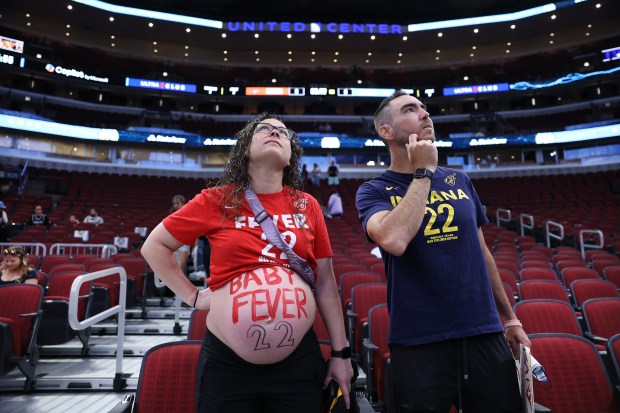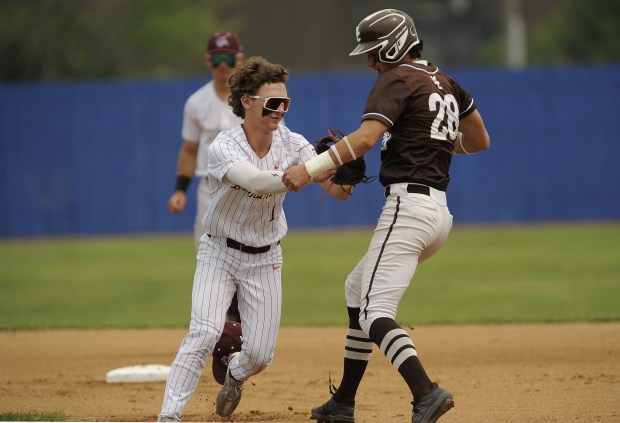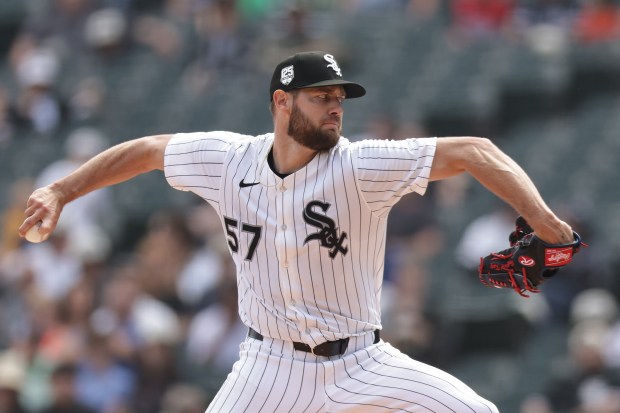Ten days after voters went to the polls to select the Democratic nominee to become Cook County’s next top prosecutor, former Appellate Justice Eileen O’Neill Burke defeated opponent Clayton Harris III.
With few votes remaining to be tallied after tens of thousands of mail-in and provisional ballots were counted in Chicago and Cook County since Election Day on March 19, O’Neill Burke declared victory Friday evening in the Cook County state’s attorney’s race. After Harris initially balked at conceding defeat, the university lecturer and former government official called O’Neill Burke to acknowledge the loss. The Associated Press also called the race for O’Neill Burke.
“It was worth the wait,” O’Neill Burke said in a campaign release. “I’d like to congratulate Clayton Harris on a hard-fought campaign. While we may have had our differences in this election, we share a love for our beautiful city and Cook County.”
At Friday’s conclusion of vote counting by Chicago and Cook County election officials, the two candidates were separated by 1,556 votes — a sum that had not budged much throughout this week. O’Neill Burke had a lead of 10,000 votes on election night, and though Harris was able to close that margin by 84%, she never lost her advantage.
Harris’ camp had held onto hope he could overtake O’Neill Burke, saying they would wait to decide what to do until the April 2 deadline when the last of valid mail-in returns are eligible to be counted.
Though there are more than 45,000 unreturned mail ballots across the city, the Chicago Board of Elections did not expect all to return properly postmarked by March 19 to meet the April 2 deadline. Returns had already been dwindling throughout this week, with daily return totals in the city numbering in hundreds, not thousands. Suburban judges reported just 19 ballots that arrived Thursday and Friday morning.
While the razor-thin race tightened with daily vote counts after Election Day, data from the Chicago Board of Elections and Cook County Clerk showed that less than 10% of all the votes tallied were done in the days after the election.
In a statement, Harris congratulated O’Neill Burke and acknowledged falling “a bit short of our goal.”
“I am incredibly proud of the broad, diverse, grassroots coalition we built countywide with the vision of a criminal justice system that focuses on safety and justice. Where we keep every resident safe — no matter what neighborhood they live in, and where we do so in a just fashion,” he said, pledging to “continue to push forward on the urgent work of criminal justice reform. That remains my commitment.”
O’Neill Burke was considered the more conservative of the two and campaigned about being tougher on crime while Harris preached of balancing safety with continuing reforms in the prosecutor’s office. The two were vying to replace two-term Cook County State’s Attorney Kim Foxx, a progressive prosecutor who had been a leader in a national movement of bringing sweeping reforms to the criminal justice system. Foxx chose to not run for a third term.
“If I’ve learned one thing during this process, it’s that there is so much more that unites us than what divides us. Across every neighborhood and every town in Cook County, people told me the same thing: we want a fair criminal justice system that works for everyone,” O’Neill Burke said in her statement. “We want a professional and effective State’s Attorney’s Office. We want illegal guns and assault weapons off our streets. We want less crime and safer communities, not by locking everyone up, but by turning people around. Whether you voted for me or not, I promise to work tirelessly as your State’s Attorney.”
Harris and O’Neill Burke were the only two candidates to emerge in the wide open election following Foxx’s announcement last April that she would not seek reelection. The news came after a bruising and historic tenure, in which Foxx undertook a raft of progressive systemic reforms in the office amid a local and national reckoning over race and policing, while weathering criticisms over her prosecutorial policies and response to the Jussie Smollett scandal.
Harris, a lecturer at the University of Chicago on race and policing, jumped into the campaign with the support of Cook County Board President and Democratic Party Chair Toni Preckwinkle — a Foxx mentor. He went on to win the party’s endorsement, despite not having run for public office previously. He explored a run for state’s attorney briefly in 2007.
For this campaign, Harris cited as key strengths his academic specialty in race and policing, his management experience from holding various roles across government and his personal story as a Black man raising a family on the city’s South Side. He earned endorsements from some of the city’s most progressive unions.
O’Neill Burke stepped down from the state’s appellate bench to run for the spot. A Chicago native, she was raised in a family of police officers and spent her entire career in and around Cook County courtrooms as a prosecutor, defense attorney and judge. She embraced many of Foxx’s reforms on the campaign trail while promising to more aggressively prosecute top-of-mind crimes such as retail theft and violence on public transit.
Though she did not have the party’s support, she racked up campaign dollars from business interests, out-earning Harris three-to-one since the beginning of 2024. That enabled her to outspend Harris on mail and television in the campaign’s final weeks.
Despite the high stakes of running the second largest prosecutor’s office in the country and its nearly 800 attorneys, the primary race had relatively low turnout compared to recent history: the 2016 election had twice as many ballots cast. Even so, few expected the race to end this closely, or for the count to last this long.
O’Neill Burke has a significant tailwind in heavily Democratic Cook County heading into the November election. She will face former alderman Bob Fioretti, a Republican who ran unopposed in the primary. Fioretti, an attorney, previously ran for top prosecutor as a Democrat. Also running is Libertarian Andrew Charles Kopinski.





